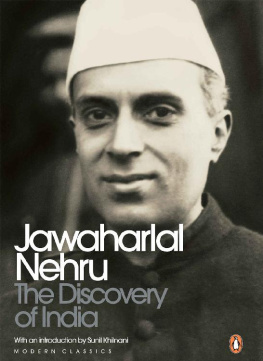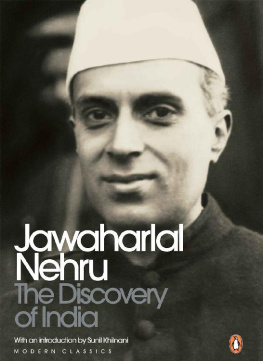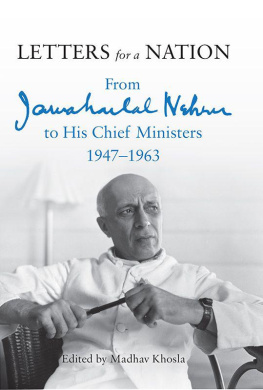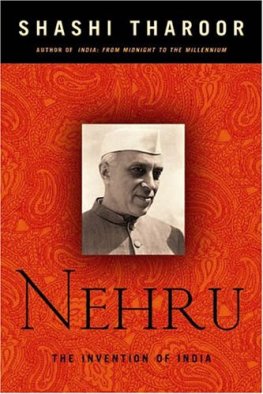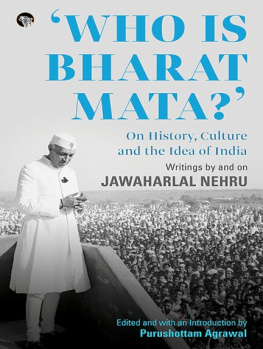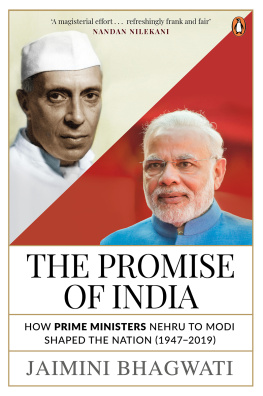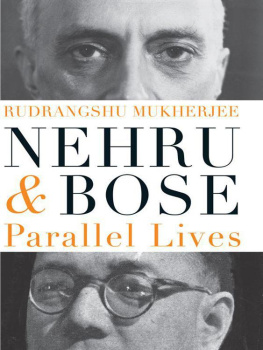Jawaharlal Nehru
The Discovery of India
Contents
PENGUIN BOOKS
THE DISCOVERY OF INDIA
Jawaharlal Nehru was born on 14 November 1889 at Allahabad and educated in England at Harrow and Cambridge. In 1912, Nehru returned home to play a central role in Indias struggle for freedom from British colonial rule, and then, as prime minister of independent India for seventeen years, went on to shape the nations future as a modern, secular and democratic state. He died in office on 27 May 1964. Visionary and idealist, scholar and statesman of international stature, Nehru was also an outstanding writer. His three most renowned booksAn Autobiography, Glimpses of World History and The Discovery of Indiahave acquired the status of classics, and are all published by Penguin.
Sunil Khilnani is Starr Foundation Professor and Director of South Asia Studies at Johns Hopkins University. He is the author of The Idea of India, published by Penguin in 1997.
To my colleagues and co-prisoners in the Ahmadnagar Fort Prison Camp from 9 August 1942 to 28 March 1945
Written over five months when Jawaharlal Nehru was imprisoned in the Ahmadnagar Fort, The Discovery of India has acquired the status of a classic since it was first published in 1946. In this work of prodigious scope and scholarship, one of the greatest figures of Indian history unfolds the panorama of the countrys rich and complex past, from prehistory to the last years of British colonial rule. Analysing texts like the Vedas and the Arthashastra, and personalities like the Buddha and Mahatma Gandhi, Nehru brings alive an ancient culture that has seen the flowering of the worlds great traditions of philosophy, science and art, and almost all its major religions.
Nehrus brilliant intellect, deep humanity and lucid style make The Discovery of India essential reading for anyone interested in India, both its past and its present.
Foreword to the 2004 Edition
J awaharlal Nehrus three classicsGlimpses of World History, An Autobiography and The Discovery of Indiaremain essential reading for anyone who wishes to understand the ideas and personalities that have shaped India through the ages, and moulded the character and special genius of her people.
The three books deal with different subjects, yet through them runs the common thread of Pandit Nehrus own vision and idealshis passionate commitment to democracy and social justice, his intense aversion to authoritarianism and fundamentalism, and his exuberant celebration of Indias pluralistic culture. All three books were written while he was in prison during the freedom movement, yet they are remarkable for their absence of bitterness. This was characteristic of Panditjis personality, as were the deep humanity and delightful joie de vivre which illuminate these pages.
Though written more than fifty years ago, these books address issues that remain vitally relevant todaythe choice between non-violence and terrorism to attain political goals, the perilous politics of caste and religion, the struggle to conquer hunger, disease and ignorance, the importance of cultivating a scientific temper. Through his views on these and other crucial questions emerges Panditjis noble vision for the India of the futurea vision that is enshrined in our Constitution, that laid the firm foundations on which we have built our democratic, secular polity, and that has made us what we are today.
Generations of readers have been moved and, indeed, enthralled by the three classics, which reflect the power and lucidity of Jawaharlal Nehrus mind, the eloquence of his language, and the radiance of his spirit. I hope they will continue to educate, inspire and guide us for generations to come.
New Delhi
27 May 2004
SONIA GANDHI
Foreword
My fathers three booksGlimpses of World History, An Autobiography and The Discovery of Indiahave been my companions through life. It is difficult to be detached about them.
Indeed Glimpses was written for me. It remains the best introduction to the story of man for young and growing people in India and all over the world. The Autobiography has been acclaimed as not merely the quest of one individual for freedom, but as an insight into the making of the mind of new India. I had to correct the proofs of Discovery while my father was away, I think in Calcutta, and I was in Allahabad ill with mumps! The Discovery delves deep into the sources of Indias national personality. Together, these books have moulded a whole generation of Indians and inspired persons from many other countries.
Books fascinated Jawaharlal Nehru. He sought out ideas. He was extraordinarily sensitive to literary beauty. In his writings he aimed at describing his motives and appraisals as meticulously as possible. The purpose was not self-justification or rationalization, but to show the rightness and inevitability of the actions and events in which he was a prime participant. He was a luminous man and his writings reflected the radiance of his spirit.
New Delhi
4 November 1980
INDIRA GANDHI
Preface
This book was written by me in Ahmadnagar Fort prison during the five months, April to September 1944. Some of my colleagues in prison were good enough to read the manuscript and make a number of valuable suggestions. On revising the book in prison I took advantage of these suggestions and made some additions. No one, I need hardly add, is responsible for what I have written or necessarily agrees with it. But I must express my deep gratitude to my fellow-prisoners in Ahmadnagar Fort for the innumerable talks and discussions we had, which helped me greatly to clear my own mind about various aspects of Indian history and culture. Prison is not a pleasant place to live in even for a short period, much less for long years. But it was a privilege for me to live in close contact with men of outstanding ability and culture and a wide human outlook which even the passions of the moment did not obscure.
My eleven companions in Ahmadnagar Fort were an interesting cross-section of India and represented in their several ways not only politics but Indian scholarship, old and new, and various aspects of present-day India. Nearly all the principal living Indian languages, as well as the classical languages which have powerfully influenced India in the past and present, were represented and the standard was often that of high scholarship. Among the classical languages were Sanskrit and Pali, Arabic and Persian; the modern languages were Hindi, Urdu, Bengali, Gujarati, Marathi, Telugu, Sindhi and Oriya. I had all this wealth to draw upon and the only limitation was my own capacity to profit by it. Though I am grateful to all my companions, I should like to mention especially Maulana Abul Kalam Azad, whose vast erudition invariably delighted me but sometimes also rather overwhelmed me, Govind Ballabh Pant, Narendra Deva and M. Asaf Ali.
It is a year and a quarter since I finished writing this book and some parts of it are already somewhat out of date, and much has happened since I wrote it. I have felt tempted to add and revise, but I have resisted the temptation. Indeed I could not have done otherwise for life outside prison is of a different texture and there is no leisure for thought or writing. It has been difficult enough for me to read again what I have written. I wrote originally in long-hand; this was typed after my release. I was unable to find time to read the typescript and the publication of the book was being delayed when my daughter, Indira, came to my rescue and took this burden off my shoulders. The book remains as written in prison with no additions or changes, except for the postscript at the end.

